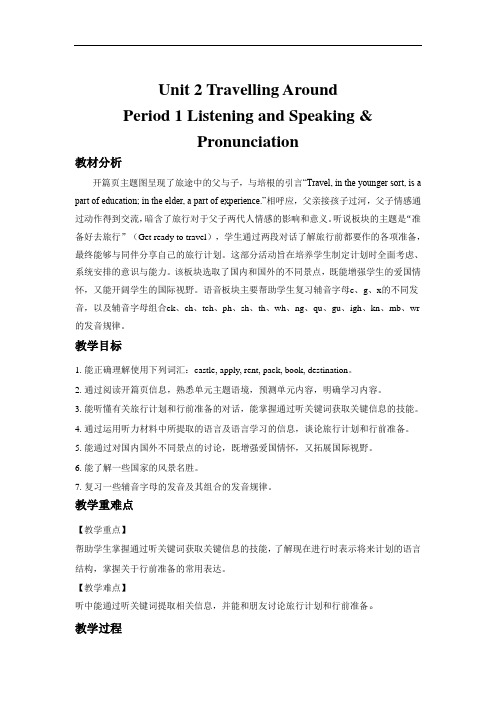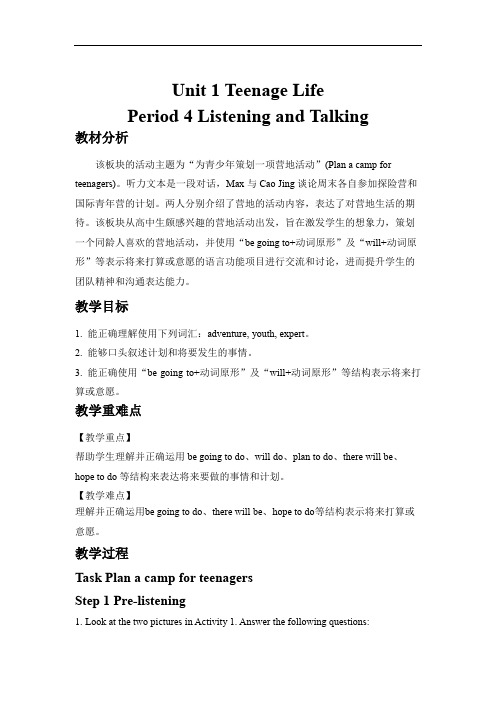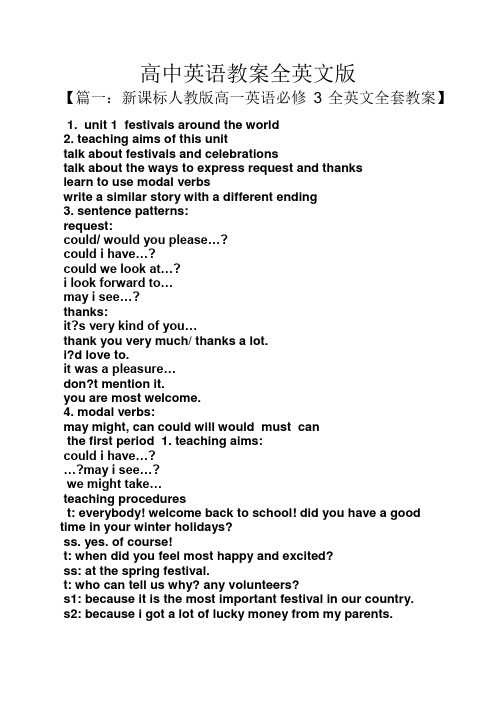新课标高中英语教案
高中英语新课标优秀教案

New Senior English For ChinaStudent’s Book 4Unit 3 A taste of English humorThe Second PeriodTeaching Aims:1.Learn and master the useful words and phrases.2.Let the student learn from nonverbal humor.3.Train the students’ predicting, skimming and summarizing ability during readingthe text.4.Encourage the students to keep optimistic attitude to life, foster sense of humorand cultivate their taste.Teaching Important Points:1.Master the following phrases and words:feel…content with, performers, astonishin g, unfortunately, worse off, ordinary, bored, entertaining, throughout, homeless, moustache, failure, overcome, leather, pick out, cut off, chew, convincing, direct, star in, outstanding, Switzerland.2.Enable the students to understand the text better.3.Improve the students’ predicting, skimming and summarizing ability.Teaching Difficult Points:1.How to make the students understand the text better.2.How to make the students understand the following sentence.Not that Charlie’s own life was easy!Teaching Methods:1.Playing the footage of The Gold Rush and asking the students some questions.2.Scanning the text to get some information about Charlie Chaplin.3.Careful reading to summarize the main ideas of each paragraph.4.Individual, pair or group work to make every student work in class.Teaching Aids:1. a multimedia classroom2.the blackboardTeaching Procedures:Step Ⅰ GreetingsGreet the whole class as usual.Step Ⅱ Leading-in and Pre-reading1. Review the content of last class (Comparing Chinese and western humor).2. Play the footage of The Gold Rush.3.Let the students think about and discuss the questions in the part of Pre-reading.If the students can not answer the questions perfectly, the teacher should consummate the answer.Step Ⅲ Reading1.Let the students scan the text to get some information about Charlie Chaplin and accomplish Comprehending One.Suggested answers:Born: 1889Job: ActorFamous character: Little trampCostume: moustache, large trousers, worn-out shoes, small round black hat, walking stick.Type of acting: nonverbal humorDied: Switzerland, 19772.Let the students carefully read the text and accomplish Comprehending Two. Suggested answers:Paragraph 1: A talent comedy actorParagraph 2: LifeParagraph 3: Little trampParagraph 4: ExampleParagraph 5: AchievementStep Ⅳ DiscussionAccomplish Comprehending Three.Suggested answers:1.Yes, I think so. Because his poor childhood offered the experience of poor life andtoughened him.2.Because he brightened the lives of Americans and British through two world warsand the hard years in between, and up to now no body has been able to do this better than him.Step Ⅴ Summary and HomeworkSummary: In this class, we have read a text about a famous prince of comed y—Charlie Chaplin. We have known that Chaplin is a talent performer. We should learn optimistic attitude to life from Charlie Chaplin. We also learned some words and phrases in the text.Homework: Let the students watch one of Charlie Chaplin’s films and then work in pairs according to Comprehending Four.Step Ⅵ The Design of Writing on the blackboardUnit 3 A taste of English humorThe Second PeriodA Master of Nonverbal HumorMain BodyParagraph 1: A talent comedy actorParagraph 2: LifeParagraph 3: Little trampParagraph 4: ExampleParagraph 5: AchievementStep Ⅶ Record after teaching。
高中教师英语教案

高中教师英语教案高中教师英语教案篇1教材分析:本课是新标准英语三年级起点第五册第四模块第一单元《It’s mine》。
本单元主要学习物品所属和名词物主代词的表达方法。
学生通过学习掌握mine、yours、argue、matter 等单词。
掌握并灵活运用句型It’s mine./It’s his/It’s lingling’s./It isn’t his 来达到学习目的。
教学目标:基于学生的实际学习水平,新课标的具体要求和本册教材的特点,我将教学目标设计如下。
1.知识目标:学生理解并掌握单词mine、yours、argue、matter、wear等。
2.能力目标:学生能够运用所学句型对自己或他人的所属物品进行描述。
3.情感目标:学生在活动中学会运用所学知识进行交流,并在交流中学会与他人合作,敢于开口说英语的能力。
教法学法:1.从儿童的年龄特点、学习兴趣和好奇心求知欲考虑,根据小学生的心理特征。
我借助“任务型”教学模式,以听说、游戏活动为主线组织教学,并通过小组合作,角色扮演等来加深对学习内容的理解,培养综合运用英语的能力。
2.学生通过游戏和小组活动,使他们在交际中理解和运用语言,促进学生听、说、读的练习,是学生在快乐的学习氛围中学到更多知识。
教学过程:一、Warming-up 热身环节在这一环节中我设计了一个chant,由学生共同拍手来完成。
I I I ,my my myHe He He, his his his热身环节是英语教学过程的首要环节。
采用节奏感很强的chant不仅能够凝聚学生的注意力,还能提高兴趣,将学生很快的带入到学习氛围中。
同时复习了以前学过的主格代词和形容词性物主代词,引出了新知识名词性物主代词,为下面的学习做好了铺垫。
二、presentation 新知呈现首先,我拿起自己的书,问学生Whose book is it? It’s my book.可用It’s mine.来代替,然后带领学生多读几遍,练习这个句型。
英语人教版高中必修一(新课标)教案Unit2 Listening and Speaking 教案

Unit 2 Travelling AroundPeriod 1 Listening and Speaking &Pronunciation教材分析开篇页主题图呈现了旅途中的父与子,与培根的引言“Travel, in the younger sort, is a part of education; in the elder, a part of experience.”相呼应,父亲接孩子过河,父子情感通过动作得到交流,暗含了旅行对于父子两代人情感的影响和意义。
听说板块的主题是“准备好去旅行”(Get ready to travel),学生通过两段对话了解旅行前都要作的各项准备,最终能够与同伴分享自己的旅行计划。
这部分活动旨在培养学生制定计划时全面考虑、系统安排的意识与能力。
该板块选取了国内和国外的不同景点,既能增强学生的爱国情怀,又能开阔学生的国际视野。
语音板块主要帮助学生复习辅音字母c、g、x的不同发音,以及辅音字母组合ck、ch、tch、ph、sh、th、wh、ng、qu、gu、igh、kn、mb、wr 的发音规律。
教学目标1.能正确理解使用下列词汇:castle, apply, rent, pack, book, destination。
2.通过阅读开篇页信息,熟悉单元主题语境,预测单元内容,明确学习内容。
3.能听懂有关旅行计划和行前准备的对话,能掌握通过听关键词获取关键信息的技能。
4.通过运用听力材料中所提取的语言及语言学习的信息,谈论旅行计划和行前准备。
5.能通过对国内国外不同景点的讨论,既增强爱国情怀,又拓展国际视野。
6.能了解一些国家的风景名胜。
7.复习一些辅音字母的发音及其组合的发音规律。
教学重难点【教学重点】帮助学生掌握通过听关键词获取关键信息的技能,了解现在进行时表示将来计划的语言结构,掌握关于行前准备的常用表达。
【教学难点】听中能通过听关键词提取相关信息,并能和朋友讨论旅行计划和行前准备。
高中英语新课标优秀教案

高中英语新课标优秀教案一、教学内容本节课选自高中英语教材第二章第五节《英语时态的应用》。
详细内容包括一般现在时、一般过去时、一般将来时、现在进行时、过去进行时、现在完成时、过去完成时等七大时态的基本概念、用法及转换规则。
二、教学目标1. 让学生掌握七大英语时态的基本概念及用法,提高语言表达能力。
2. 培养学生运用不同时态进行句子转换的能力,提高语法水平。
3. 激发学生学习英语的兴趣,培养合作学习、主动探究的良好习惯。
三、教学难点与重点教学难点:一般将来时、现在完成时、过去完成时的用法及句子转换。
教学重点:七大时态的基本概念、用法及转换规则。
四、教具与学具准备1. 教具:多媒体教学设备、PPT课件、黑板、粉笔。
2. 学具:英语课本、练习本、文具。
五、教学过程1. 导入:通过播放一段关于时间变化的短视频,引导学生关注不同时间背景下动词的变化,从而引出本节课的主题——时态。
2. 讲解:详细讲解七大时态的基本概念、用法及转换规则,结合实际例子,让学生更好地理解。
3. 例题讲解:针对每个时态,给出典型例题,引导学生运用所学知识进行分析。
4. 随堂练习:布置相关练习题,让学生独立完成,巩固所学知识。
5. 小组讨论:将学生分成小组,讨论各时态在实际语境中的应用,提高语言运用能力。
7. 作业布置:布置课后作业,要求学生完成相关练习。
六、板书设计1. 英语时态的应用2. 内容:一般现在时、一般过去时、一般将来时现在进行时、过去进行时现在完成时、过去完成时各时态的用法及转换规则七、作业设计1. 作业题目:(1)请用一般现在时描述你的日常作息。
(2)请用一般过去时描述你昨天做了什么。
(3)请用一般将来时描述你明天的计划。
(4)请用现在进行时描述你正在做什么。
(5)请用过去进行时描述昨天你在做什么。
(6)请用现在完成时描述你已经完成的任务。
(7)请用过去完成时描述昨天之前已经完成的任务。
2. 答案:(1)I get up at 6:00 a.m. every day and go to schoolat 7:00 a.m.(2)Yesterday, I went to the library and read some books.(3)Tomorrow, I will go to the zoo with my friends.(4)I am studying for the English test.(5)Yesterday, I was watching TV when my friendcalled me.(6)I have finished my homework.八、课后反思及拓展延伸1. 课后反思:本节课通过实践情景引入、例题讲解、随堂练习等多种教学手段,让学生掌握了七大时态的基本概念、用法及转换规则。
英语人教版高中必修一(新课标)教案Unit1 Listening and Talking 教案

Unit 1 Teenage LifePeriod 4 Listening and Talking教材分析该板块的活动主题为“为青少年策划一项营地活动”(Plan a camp for teenagers)。
听力文本是一段对话,Max与Cao Jing谈论周末各自参加探险营和国际青年营的计划。
两人分别介绍了营地的活动内容,表达了对营地生活的期待。
该板块从高中生颇感兴趣的营地活动出发,旨在激发学生的想象力,策划一个同龄人喜欢的营地活动,并使用“be going to+动词原形”及“will+动词原形”等表示将来打算或意愿的语言功能项目进行交流和讨论,进而提升学生的团队精神和沟通表达能力。
教学目标1. 能正确理解使用下列词汇:adventure, youth, expert。
2. 能够口头叙述计划和将要发生的事情。
3. 能正确使用“be going to+动词原形”及“will+动词原形”等结构表示将来打算或意愿。
教学重难点【教学重点】帮助学生理解并正确运用be going to do、will do、plan to do、there will be、hope to do等结构来表达将来要做的事情和计划。
【教学难点】理解并正确运用be going to do、there will be、hope to do等结构表示将来打算或意愿。
教学过程Task Plan a camp for teenagersStep 1 Pre-listening1.Look at the two pictures in Activity 1. Answer the following questions:(1)What kind of camp is Adventure Camp/International Youth Camp?(2)What activities will it include?(3)What can students learn in these activities?2.Read the sentences in Activity 1. Then predict the main idea of the conversation. Step 2 While-listening1. Work on Activity 1. Listen to the conversation and tick what are heard about the camps.2.Work on Activity 2. Underline the expressions in the sentences above that Cao Jing and Max use to talk about the future.设计意图:该环节让学生通过勾画听力文本中的目标结构,关注对话中如何表达将来要做的事情和计划。
新课标高中英语教案范文

新课标高中英语教案范文一、教学目标1. 知识目标:(1)掌握新课标高中英语的基本语法和词汇。
(2)提高听说读写技能,能够熟练运用英语进行日常交流。
(3)了解和理解英语文化背景知识。
2. 能力目标:(1)培养学生的英语思维能力,提高跨文化交际能力。
(2)培养学生的自主学习能力,提高英语学习兴趣。
3. 情感目标:(1)培养学生的团队合作精神,增强集体荣誉感。
(2)培养学生的自信心,树立终身学习的理念。
二、教学内容1. 第一章:英语语音和语法(1)学习英语音标,掌握基本发音规则。
(2)学习基本句型,掌握句子结构。
2. 第二章:词汇和短语(1)学习常用词汇和短语,丰富词汇量。
(2)学习词汇的搭配和用法。
3. 第三章:听力理解(1)通过听力材料,提高学生的听力技能。
(2)学习听力策略,提高听力理解能力。
4. 第四章:阅读理解(1)阅读各类文章,提高阅读技能。
(2)学习阅读策略,提高阅读理解能力。
5. 第五章:写作技能(1)学习写作的基本步骤和技巧。
(2)练习写作,提高写作能力。
三、教学方法1. 任务型教学法:通过完成各种任务,提高学生的英语实际运用能力。
2. 交际型教学法:通过角色扮演、小组讨论等活动,培养学生的英语交际能力。
3. 情境教学法:通过创设真实情境,提高学生的英语学习兴趣。
四、教学评价1. 形成性评价:通过课堂表现、作业、小测等方式,及时了解学生的学习情况,给予反馈。
2. 终结性评价:通过期中期末考试,评估学生的学习成果。
五、教学资源1. 教材:新课标高中英语教材。
2. 多媒体教学设备:用于播放听力材料、视频等教学资源。
3. 网络资源:用于查找相关英语学习资料和背景知识。
六、教学策略1. 激发学生学习兴趣:通过丰富的教学活动和实际案例,激发学生学习英语的兴趣。
2. 注重个体差异:因材施教,针对不同学生的学习水平和需求进行教学。
4. 创设语言环境:利用多媒体设备和网络资源,为学生提供丰富的语言学习环境。
新课标高中英语1必修全册教案

新课标高中英语1必修全册教案一、教学内容1. Unit 1 My First Day at Senior High详细内容:描述了学生在高中的第一天,通过对话和阅读了解校园生活。
2. Unit 2 My New Teachers详细内容:介绍了几位不同风格的老师,学习如何描述人物特点。
二、教学目标1. 掌握本单元的重点词汇和短语,并能灵活运用到实际情景中。
2. 提高学生的听说读写能力,尤其是描述人物和事件的能力。
3. 培养学生学会尊重和理解不同的教学风格,增强团队合作意识。
三、教学难点与重点1. 教学难点:描述人物特点的词汇和句型,以及如何运用到实际情景中。
2. 教学重点:听说读写技能的培养,尤其是口语表达能力的提高。
四、教具与学具准备1. 教具:多媒体设备、PPT、黑板、录音机、卡片等。
2. 学具:课本、练习本、字典、笔等。
五、教学过程1. 导入:通过展示一组学生在高中第一天的照片,引发学生讨论,导入新课。
2. 新课内容展示:讲解Unit 1 My First Day at Senior High 的重点词汇和句型,进行角色扮演活动。
3. 例题讲解:针对Unit 2 My New Teachers,讲解如何描述人物特点,给出示例。
4. 随堂练习:让学生运用所学知识,描述自己的老师,进行小组讨论。
5. 口语练习:模拟情景,让学生进行对话练习,提高口语表达能力。
六、板书设计1. Unit 1 My First Day at Senior High重点词汇:nervous, excited, confused, helpful, friendly等。
重点句型:I felt when; The teacher is and he/she等。
2. Unit 2 My New Teachers描述人物特点的词汇:strict, patient, humorous, knowledgeable等。
描述人物特点的句型:My teacher is; He/She always等。
高中英语教案全英文版

高中英语教案全英文版【篇一:新课标人教版高一英语必修3全英文全套教案】1. unit 1 festivals around the world2. teaching aims of this unittalk about festivals and celebrationstalk about the ways to express request and thankslearn to use modal verbswrite a similar story with a different ending3. sentence patterns:request:could/ would you please…?could i have…?could we look at…?i look forward to…may i see…?thanks:it?s very kind of you…thank you very much/ thanks a lot.i?d love to.it was a pleasure…don?t mention it.you are most welcome.4. modal verbs:may might, can could will would must canthe first period 1. teaching aims:could i have…?…?may i see…?we might take…teaching procedurest: everybody! welcome back to school! did you have a good time in your winter holidays?ss. yes. of course!t: when did you feel most happy and excited?ss: at the spring festival.t: who can tell us why? any volunteers?s1: because it is the most important festival in our country.s2: because i got a lot of lucky money from my parents.s3: because i needn?t study at festivals and there was a lot of delicious food to eat.how great.s4: because i met my cousins and friends who i hadn?t seen for a long time.t. very food! i am glad to hear that. today we will talk about festivals, which aremeant to celebrate important events. please think about some other festivals. can you name just a few?ss: new year, yuan xiao festival…:t: quite right. that?s called the lantern?s festival. how about some otherfestivals?ss: the army day, international labour?s day, national day, tomb sweepingfestival, dragon boat festival, mid-autumn day…t: you have done a good job, boys and girls! .step Ⅱwarming –uplike best---the music, the things to see, the visits or the food? step Ⅳassignment1. consolidation2. listening to the material again after class to be familiar with it.3. homework: collect as much information about festivals as possible.the second period readingteaching aims1.vocabulary: starve, starvation, plenty, satisfy ancestor lamps lead feast bone originin memory of dress up trick poet arrival national gain independencegather agricultural european custom awards watermelon handsomerooster admire look forward to religious as though have fun with daily2.to enable the students to know the earliest festivals with reasons for them and four different kinds of festivals that occur in most parts of the world3.to enable the students to master some english expressions and phrases festivals.4. teach the basic reading skills: skimming and scanning.5. try to compare and make conclusion s of different festivals. step Ⅰrevision1. greetings.2. review the new words of this part.3. check the students? homework---festivalsstep Ⅱreading1.scanning( four minutes later, with the whole class. show the suggested ( allow to read aloud and carefully this time to understand the main3.reading and discussiont: read the text a third time and then work impairs to do exercise 2 on page 3.( let the students have enough time to read the passage carefully and discuss the chart with their partners. encourage them to expand their answers according to their own experiences.)4.explanation(in this part try to help the students analyse the difficult, long and complex sentences and guess the meaning of the new words; ask them to deal with the language points in the context.)t: now i will discuss some important sentences and phrases in the passage.a. some festivals are held to honor the dead, or satisfy and please the ancestors,who could return either to help or to do harm.b. in memory ofc. the leader who helped gain india?s independence from britain.d. a season of agricultural work is over.e. the end of winter and to the coming of spring.f. be covered with pink snow.the suggested explanation:a. an attributive clause.dead or to make happy in case they might come back to do harm.b.(hoping)(defending)c. →energetic adj. ( full of or done with energy)look forward to ( to is a preposition here.)devote to, be/get used to, get down to , stick toe.g. i?m looking forward to hearing from you.step Ⅲ listeningt: now i will play the tape for you. you can just listen with your books closed or look at your books or read in a low voice together with the tape. it?s up to you. after listening, please write down three things that most festivals seem to have incommon.( comprehending ex.3 on page 3).the third period learning about languageteaching aims:1. let the students know the usage of modal verbs.2. enable the students to recognize the words and expressions in the reading passageaccording to what mean the same as them.step Ⅰ greeting and revision( ask some students to retell the text we learned .)stepⅡ. practicing the useful words and expressionst: as we know, there are two important kinds of and intransitive verbs. but many intransitive verbs structure on.the words given.s2: we are talking about verbs.s3: would you like to talk with me?step Ⅲ verbs form and try to explain their meanings. if you have anystepthe usage of modal verbs. i think it is not easy for you to master them, after class you should review them.homework1. practice of wbp42ex.1,2,3.2. please find out10 sentences with modal verbs, and try to get their meanings.the fourth period listening【篇二:高中英语教案范例】新年第一节英语课(高一教案)step i greetings and lead in(问候以及导入)1. happy new year!t: well, i am so happy to see you again after the long vacation.i wish everyone of you had a happy holiday. so how about your holiday? had you done some travel? 2. learn someexpressions about “dragon”(学习一些关于中国龙的习语、成语)t: this year is the year of dragon, so we will play a guessing game. i will show the english expressions and you try to guess the chinese expressions, long included.step ii revision(复习)1. dear, how many words can you still remember after amonths winter holiday?2. 2. how many phrases can you still remember?3.3. do you still remember the grammar very closely?there is no shortcut in the science road ,only be deligent.在科学上没有平坦的大道,只有不畏劳苦沿着陡峭山路攀登的人,才有希望达到光辉的顶点。
- 1、下载文档前请自行甄别文档内容的完整性,平台不提供额外的编辑、内容补充、找答案等附加服务。
- 2、"仅部分预览"的文档,不可在线预览部分如存在完整性等问题,可反馈申请退款(可完整预览的文档不适用该条件!)。
- 3、如文档侵犯您的权益,请联系客服反馈,我们会尽快为您处理(人工客服工作时间:9:00-18:30)。
1.May Day, Spring Festival, Christmas Day, Valentine’s Day, Fool’s Day, New Year’s Day, National Day, Mid- autumn Day, Teachers’Day, Mother’s Day(falling on the second Sunday in May)/Father’s Day/Children’s Day, Dragon Boat Festival, (falling on the fifth day of the fifth lunar month)
2. Obon, Halloween(10.31), Pure Brightness Day/Clear and Bright Day
3. Festivals you have discussed
1.May Day, Spring Festival, Christmas Day, Valentine’s Day, Fool’s Day, New Year’s Day, National Day, Mid- autumn Day, Teachers’Day, Mother’s Day(falling on the second Sunday in May)/Father’s Day/Children’s Day, Dragon Boat Festival, (falling on the fifth day of the fifth lunar month)
2. Obon, Halloween(10.31), Pure Brightness Day/Clear and Bright Day
3. Festivals you have discussed
1.May Day, Spring Festival, Christmas Day, Valentine’s Day, Fool’s Day, New Year’s Day, National Day, Mid- autumn Day, Teachers’Day, Mother’s Day(falling on the second Sunday in May)/Father’s Day/Children’s Day, Dragon Boat Festival, (falling on the fifth day of the fifth lunar month)
2. Obon, Halloween(10.31), Pure Brightness Day/Clear and Bright Day
3. Festivals you have discussed
1.May Day, Spring Festival, Christmas Day, Valentine’s Day, Fool’s Day, New Year’s Day, National Day, Mid- autumn Day, Teachers’Day, Mother’s Day(falling on the second Sunday in May)/Father’s Day/Children’s Day, Dragon Boat Festival, (falling on the fifth day of the fifth lunar month)
2. Obon, Halloween(10.31), Pure Brightness Day/Clear and Bright Day
3. Festivals you have discussed
1.May Day, Spring Festival, Christmas Day, Valentine’s Day, Fool’s Day, New Year’s Day, National Day, Mid- autumn Day, Teachers’Day, Mother’s Day(falling on the second Sunday in May)/Father’s Day/Children’s Day, Dragon Boat Festival, (falling on the fifth day of the fifth lunar month)
2. Obon, Halloween(10.31), Pure Brightness Day/Clear and Bright Day
3. Festivals you have discussed
1.May Day, Spring Festival, Christmas Day, Valentine’s Day, Fool’s Day, New Year’s Day, National Day, Mid- autumn Day, Teachers’Day, Mother’s Day(falling on the second Sunday in May)/Father’s Day/Children’s Day, Dragon Boat Festival, (falling on the fifth day of the fifth lunar month)
2. Obon, Halloween(10.31), Pure Brightness Day/Clear and Bright Day
3. Festivals you have discussed。
